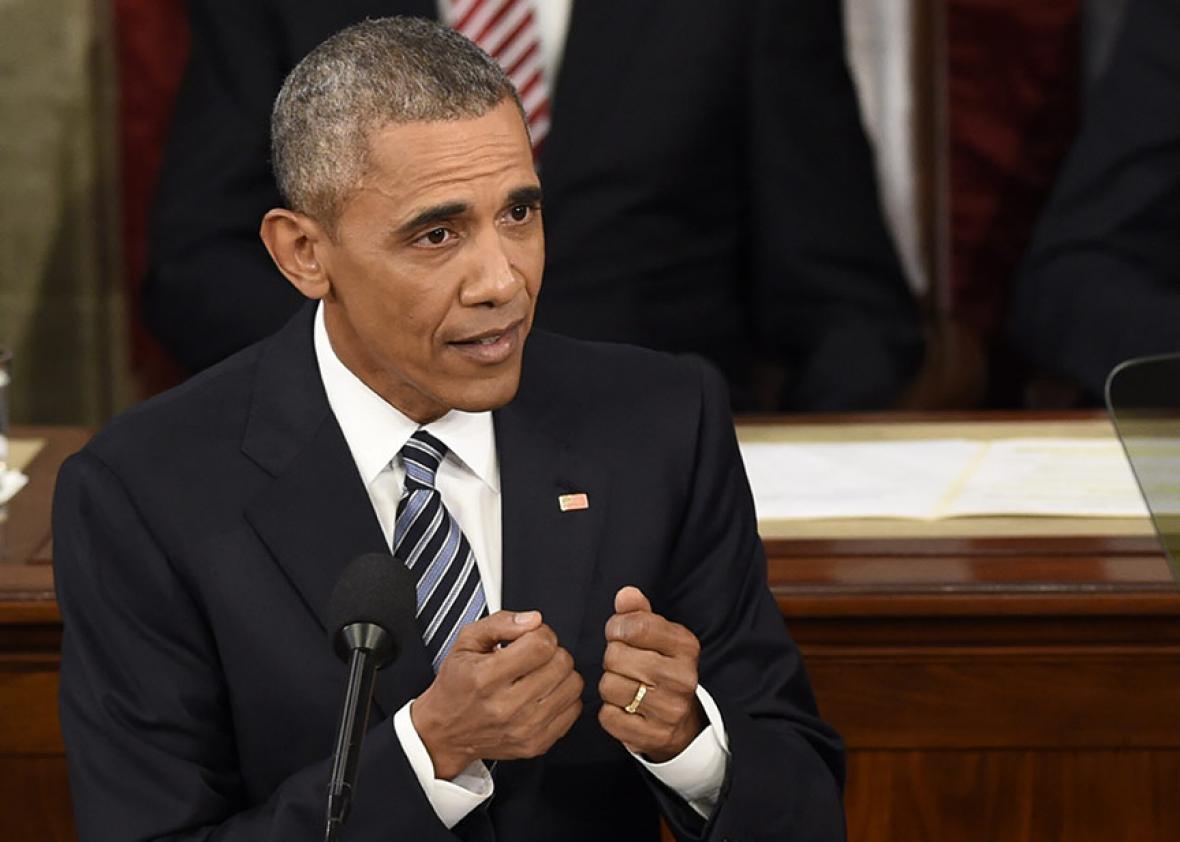More than anything else, President Obama’s final State of the Union address was a plea for cooperation and compromise—an appeal to America’s citizenry, not just its public. “[D]emocracy does require basic bonds of trust between its citizens,” said Obama at the conclusion of his address. “It doesn’t work if we think the people who disagree with us are all motivated by malice, or that our political opponents are unpatriotic.”
It also doesn’t work, Obama argued, if the system puts limits and barriers on democratic participation. It’s why, in the midst of this appeal, he called for nonpartisan redistricting and moves to “make voting easier, not harder.”
But policy wasn’t the thrust of the message. This was a rebuke to forces of fear and cynicism—a call for decency and obligation in our politics. “So, my fellow Americans,” said Obama, “whatever you may believe, whether you prefer one party or no party, our collective future depends on your willingness to uphold your obligations as a citizen.”
All of this speaks to Obama’s particular view of American exceptionalism, where America is shorthand for its people, and their ability—and willingness—to confront America with its ideals and push the nation to achieve them. With this final State of the Union address, Obama is asking Americans to do just that. To live up to the traits that make them exceptional.
If you hold to a certain kind of civic nationalism—expansive, pluralistic, progressive—it’s hard to find fault with this articulation. But this section of the State of the Union—this call for our better angels as citizens—sits in tension with the rest.
Obama has an expansive, positive agenda that grows from his belief that America can’t prosper without an active and interventionist government. “We need benefits and protections that provide a basic measure of security,” he said. Obama wants stronger retirement programs, a fierce effort to fight climate change, new investment in science, technology, and infrastructure. He wants universal preschool, paid family leave, and greater access to health care.
More than that, however, Obama has a diagnosis of American society that comes with several questions. His agenda is an attempt to answer those questions, and he believes that the country writ large will have to answer those questions: “[H]ow do we give everyone a fair shot at opportunity and security in this new economy?; how do we make technology work for us, and not against us — especially when it comes to solving urgent challenges like climate change? [H]ow do we keep America safe and lead the world without becoming its policeman? [H]ow can we make our politics reflect what’s best in us, and not what’s worst?”
The problem is that these aren’t neutral questions. At each turn, they carry an implicit judgment that stems from particular beliefs and a particular ideology. Each question holds a premise. Which means, if we take disagreement and difference seriously, then we must acknowledge that people disagree about these premises. “How do we give everyone a fair shot at opportunity and security” only makes sense if you believe that everyone deserves a fair shot. But not everyone does. Not just by their revealed preferences—what they do—but as a matter of ideology and belief. Not everyone believes America should shy away as the world’s “policeman.” Not everyone sees politics as a place for cooperation.
Obama was prosaic in this State of the Union, but he was also cocky. He bragged; about America’s economic growth, about its global leadership, about his record as president of the United States. He’s proud of his tenure and clearly hopes a future president extends his legacy, or at least tackles his questions.
But that’s not guaranteed. The leading GOP candidates for president—Donald Trump and Sen. Ted Cruz—bring fundamentally different premises to American society and ask fundamentally different questions. Large and influential parts of the Republican Party hold radically minimalist views of government and want to change the Constitution to achieve them.
Because we live in a society of real and irreducible disagreement—and because it’s channeled in our politics—there’s a real chance that Obama’s legacy won’t last longer than his administration.
Which brings us back to Obama’s conclusion. Obama seems to anticipate this kind of objection. “A better politics doesn’t mean we have to agree on everything,” he said. “This is a big country, with different regions and attitudes and interests.”
He continues: “Our Founders distributed power between states and branches of government, and expected us to argue, just as they did, over the size and shape of government, over commerce and foreign relations, over the meaning of liberty and the imperatives of security.” Obama takes this seriously. But does he take it seriously enough? The founders’ conflicts, after all, eventually ended in civil war.
Democracy does require basic bonds of trust between its citizens, and it doesn’t work if we hold each other in deep mutual suspicion. But we should also be clear-eyed about what democracy also means: Consensus is extraordinarily difficult, and at times—like this one—often impossible.
